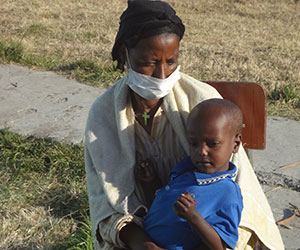- What We Do
- Agriculture and Food Security
- Democracy, Human Rights and Governance
- Economic Growth and Trade
- Education
- Ending Extreme Poverty
- Environment and Global Climate Change
- Gender Equality and Women's Empowerment
- Global Health
- Water and Sanitation
- Working in Crises and Conflict
- U.S. Global Development Lab

MDR-TB survivors Azmara and her son Fesseha
Photo credit: USAID Ethiopia
For 3 years, Azmara Ashenafi had been losing weight and suffering from a recurrent cough and frequent fevers. Although the local health facility had diagnosed Azmara with tuberculosis (TB), the 6 months of TB treatment had failed to alleviate her symptoms. Fearing she would soon be too ill to care for her three young children, Azmara left her village to seek better care at the health center in Muja. There, a health officer, who had been trained by the U.S. Agency for International Development (USAID), suspected Azmara might have multidrug-resistant TB (MDR-TB) and sent a sputum sample and a drug sensitivity test to the nearest reference laboratory.
Azmara’s sputum culture proved that she indeed had MDR-TB. The health center arranged for an ambulance to transport Azmara to an MDR-TB treatment center at Boru Meda Hospital, where a USAID-supported program had recently helped renovate a 20-bed treatment center and had trained physicians, nurses and lab professionals on MDR-TB treatment and follow-up.
Azmara was one of the first patients admitted in the new MDR-TB treatment center. The MDR-TB physician also screened Azmara’s family since the likelihood of MDR-TB transmission is high among those in close contact with anyone with an active infection. The physician was able to identify that Azmara’s 3-year-old son, Fesseha, also had MDR-TB symptoms, and the little boy was put on treatment immediately.
After 2 months of hospitalization, Azmara’s first sputum microscopic test was negative. Her health, as well as her little boy’s, improved quickly, and she was discharged from the hospital to continue her 2-year course of MDR-TB treatment under direct observation at the nearest health center. At their 1-year follow-up visit in 2015, Azmara and Fesseha were considered in good health and are continuing with their treatment. “I thank the Muja Health Center and Boru Meda Hospital staff for diagnosing the disease and initiating free MDR-TB treatment as well as the regular follow-ups to save mine and my child’s life,” says Azmara.
Since the USAID-supported project began in 2011, three new MDR-TB treatment hospitals have been renovated in Ethiopia, and more than 5,000 health workers have been trained on TB and MDR-TB identification, including staff at the Muja Health Center, where Azmara was treated. As of September 2013, 211 new MDR-TB patients have initiated treatment through the project’s support. With the additional use of Xpert, the diagnosis of MDR-TB was has occurred more rapidly.







Comment
Make a general inquiry or suggest an improvement.